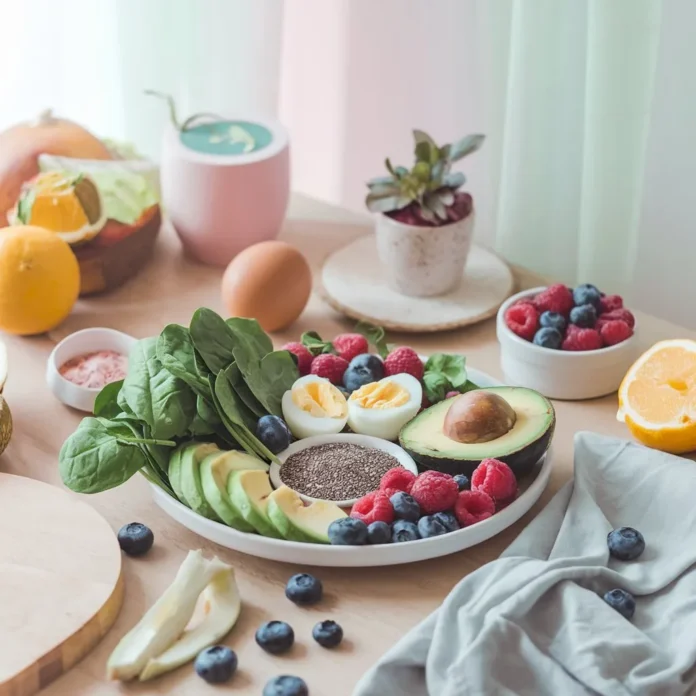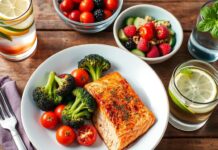
Pregnancy is a transformative journey, and what you eat plays a crucial role in ensuring both your health and your baby’s development. Did you know that 90% of pregnant women don’t get enough key nutrients like folate and iron? These nutrients are essential for preventing complications and supporting your baby’s growth. In this article, we’ll explore the 10 best foods for a healthy pregnancy, offering practical tips and insights to help you make the best dietary choices.
Table of Contents
Why Nutrition is Crucial During Pregnancy
The Impact on the Mother
A balanced pregnancy nutrition plan helps maintain your energy levels, supports your immune system, and reduces the risk of complications like gestational diabetes and preeclampsia. Proper nutrition also aids in postpartum recovery, ensuring you’re strong and healthy after delivery.
The Impact on the Baby
Your baby relies entirely on you for nutrients. Key vitamins and minerals like folate, iron, calcium, and omega-3 fatty acids are vital for:
- Brain development
- Bone and muscle growth
- Immune system formation
- Healthy birth weight
According to the American Pregnancy Association, a well-balanced healthy pregnancy diet can significantly reduce the risk of birth defects and long-term health issues for your child.
The 10 Best Foods for a Healthy Pregnancy
1. Spinach: The Iron Powerhouse for Expecting Moms
Spinach is packed with iron, which helps prevent anemia—a common issue during pregnancy. It’s also rich in folate, a nutrient that supports fetal brain development and reduces the risk of neural tube defects.
- Key Nutrients: Iron, folate, vitamin A, calcium.
- How to Enjoy: Add spinach to smoothies, salads, or omelets.
- Recipe Idea: Try a spinach and feta omelet for a nutrient-packed breakfast.
2. Chia Seeds: Omega-3s for Baby’s Brain Development
Chia seeds are an excellent plant-based source of omega-3 fatty acids, particularly ALA, which supports your baby’s brain and eye development. They’re also high in fiber, helping to prevent constipation.
- Key Nutrients: Omega-3s, fiber, protein, calcium.
- How to Enjoy: Add chia seeds to smoothies, yogurt, or oatmeal.
- Recipe Idea: Chia pudding with almond milk and fresh berries.
3. Eggs: A Complete Protein Source
Eggs are a versatile and affordable source of high-quality protein, which is essential for your baby’s growth. They also contain choline, a nutrient that supports brain development.
- Key Nutrients: Protein, choline, vitamin B12.
- How to Enjoy: Hard-boiled, scrambled, or in a veggie-packed frittata.
- Recipe Idea: Spinach and mushroom frittata.
4. Greek Yogurt: Calcium for Strong Bones
Greek yogurt is rich in calcium, which is vital for your baby’s bone development. It also provides probiotics, which support digestive health.
- Key Nutrients: Calcium, protein, probiotics.
- How to Enjoy: Add fresh berries and a drizzle of honey for a healthy snack.
- Recipe Idea: Greek yogurt parfait with granola and fruit.
5. Sweet Potatoes: Vitamin A for Healthy Vision
Sweet potatoes are loaded with beta-carotene, which your body converts into vitamin A. This nutrient is essential for your baby’s vision and immune system.
- Key Nutrients: Vitamin A, fiber, potassium.
- How to Enjoy: Roast sweet potatoes as a side dish or mash them for a healthy alternative to regular potatoes.
- Recipe Idea: Baked sweet potato fries with a sprinkle of paprika.
6. Avocados: Healthy Fats for Energy
Avocados are a great source of healthy monounsaturated fats, which provide energy and support your baby’s brain development. They’re also rich in folate and potassium.
- Key Nutrients: Healthy fats, folate, potassium.
- How to Enjoy: Spread avocado on whole-grain toast or add it to salads.
- Recipe Idea: Avocado and tomato toast with a sprinkle of sea salt.
7. Lentils: Folate for Fetal Growth
Lentils are an excellent plant-based source of folate, which is crucial for preventing birth defects. They’re also high in fiber, helping to prevent constipation—a common pregnancy complaint.
- Key Nutrients: Folate, protein, fiber.
- How to Enjoy: Add lentils to soups, stews, or salads.
- Recipe Idea: Lentil and vegetable soup.
8. Berries: Antioxidants for Immunity
Berries are packed with antioxidants, which help protect your cells from damage. They’re also a great source of vitamin C, which boosts your immune system and helps your body absorb iron.
- Key Nutrients: Antioxidants, vitamin C, fiber.
- How to Enjoy: Add berries to yogurt, oatmeal, or smoothies.
- Recipe Idea: Mixed berry smoothie with Greek yogurt.
9. Whole Grains: Fiber for Digestive Health
Whole grains like oats, quinoa, and brown rice are rich in fiber, which helps prevent constipation and keeps your digestive system healthy. They also provide B vitamins and iron.
- Key Nutrients: Fiber, B vitamins, iron.
- How to Enjoy: Use whole grains as a base for bowls or as a side dish.
- Recipe Idea: Quinoa salad with roasted vegetables.
10. Nuts and Seeds: Magnesium for Muscle Relaxation
Nuts and seeds are a great source of magnesium, which helps relax muscles and prevent cramps. They’re also rich in healthy fats and protein.
- Key Nutrients: Magnesium, healthy fats, protein.
- How to Enjoy: Snack on a handful of almonds or add chia seeds to smoothies.
- Recipe Idea: Homemade trail mix with nuts, seeds, and dried fruit.
Additional Tips for a Healthy Pregnancy Diet
Meal Planning
Plan your meals ahead of time to ensure you’re getting a variety of nutrients. Include a mix of proteins, healthy fats, and complex carbohydrates in every meal.
Healthy Snacks
Opt for nutrient-dense snacks like:
- Greek yogurt with berries
- Apple slices with almond butter
- Carrot sticks with hummus
Hydration
Stay hydrated by drinking plenty of water. Aim for at least 8-10 glasses a day. You can also try infused water with lemon or cucumber for added flavor.
Foods to Avoid
- Raw or undercooked meat and eggs
- Unpasteurized dairy products
- High-mercury fish like shark and swordfish
- Excessive caffeine and alcohol
FAQ
1. Can I eat sushi during pregnancy?
It’s best to avoid raw fish during pregnancy due to the risk of foodborne illnesses. Opt for cooked sushi instead.
2. How much weight should I gain during pregnancy?
The recommended weight gain depends on your pre-pregnancy BMI. On average, women should gain 25-35 pounds during pregnancy.
3. Are supplements necessary during pregnancy?
Prenatal vitamins are recommended to ensure you’re getting enough key nutrients like folate, iron, and calcium. Consult your healthcare provider for personalized advice.
Conclusion
A healthy diet during pregnancy is one of the best gifts you can give to yourself and your baby. By incorporating these 10 best foods for a healthy pregnancy into your daily meals, you’ll support your baby’s growth and development while maintaining your own health. Remember, every bite counts!
Download our free pregnancy meal plan to get started on your journey to a healthier pregnancy. Don’t forget to share this article with other moms-to-be and subscribe to our newsletter for more tips and resources!
Main References
- American Pregnancy Association: www.americanpregnancy.org
- Centers for Disease Control and Prevention (CDC): www.cdc.gov
- Mayo Clinic: www.mayoclinic.org




















